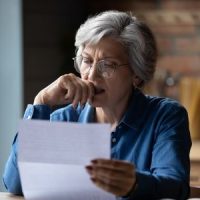Why Should I File Chapter 7 Bankruptcy?

In a nutshell, control is the best reason to file Chapter 7 bankruptcy, or more specifically, regaining control. Divorce, job loss, medical bills, and other unpredictable financial storms cause most bankruptcy filings. During these storms, ships are tossed around wherever the wind and other weather takes them. Bankruptcy calms the storm and allows your ship to return to port. At that time, you can sail wherever you want to go.
The calming-the-storm and returning-to-port process includes three major steps, which are outlined below. Every step of the way, a Chicago bankruptcy lawyer helps families get the most out of the Chapter 7 bankruptcy process. Despite a significant law change in 2005, most people pass the means test and are eligible to file Chapter 7. This form of bankruptcy is like a legal shortcut that leads to a fresh financial start.
Automatic Stay
We mentioned the bad weather in a storm above. The “bad weather” in a financial storm, which could easily sink a ship, includes:
- Repossession/Foreclosure: Legally, banks can seize motor vehicles and houses after one missed payment, at least in most cases. The auto repossession process usually starts even earlier. Most new cars have remote ignition disabling devices. As a rule of thumb, a repossession or foreclosure is easy to stop but hard to undo. So, if your property is at risk, call a Chicago bankruptcy lawyer immediately.
- Creditor Harassment: This adverse weather takes many forms, such as harassing phone calls, debt collection lawsuits, wage garnishment, and bank account levy. Chapter 7 bankruptcy stops all these creditor adverse actions. Creditors must get special permission from the judge to resume harassing activities.
- PTSD: Outside of a severe personal injury, money problems might be the most stressful event in life. When people worry about money, they don’t sleep well at night and thus don’t function well during the day. Furthermore, money problems lead to depression and fear issues. The Automatic Stay stops financial PTSD.
Usually, Section 362 takes effect the moment debtors file their voluntary petitions and remains in effect until the judge closes the case.
Asset Protection
Chapter 7 bankruptcy keeps creditors at bay, but it also gives the trustee (person who oversees the bankruptcy for the judge) the right to liquidate nonexempt property in order to pay debts. The key word here is nonexempt, Illinois has broad bankruptcy exemptions that protect:
- Motor vehicles,
- Houses,
- Retirement accounts,
- Personal property, and
- Government benefits.
Property exemptions in Illinois often go well beyond the written exemptions. The mootness doctrine is a good example.
Assume Phil has $3,000 in a savings account. The written exemptions don’t protect this money. The trustee claims ownership, since the asset is nonexempt, and demands the money. By the time the matter goes to court, Phil has spent the money. Now, it doesn’t matter who owned the money, because the money’s gone and the point is moot.
Debt Discharge
Chapter 7 discharges most credit cards, medical bills, and other unsecured debts. Imagine what your family can do with the money it was paying doctors and credit card companies.
Bankruptcy eliminates the legal obligation to pay a debt, but it doesn’t eliminate the debt itself. A bankruptcy judge doesn’t have that power. Assume Mike owes tuition to State U, and the school withholds his transcript. Bankruptcy eliminates the repayment obligation, but State U can continue to withhold his transcript. A lawyer must deal with the matter separately.
Connect With a Diligent Cook County Lawyer
No matter what kind of financial problem you are having, bankruptcy could be a way out. For a free consultation with an experienced bankruptcy attorney in Chicago, contact the Bentz Holguin Law Firm, LLC. Convenient payment plans are available.


